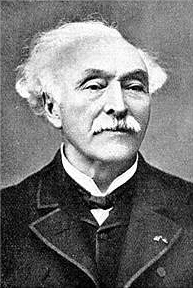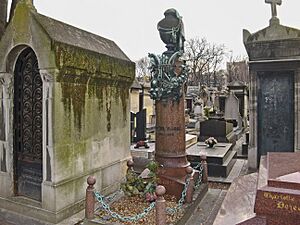Victor Massé facts for kids
Quick facts for kids
Victor Massé
|
|
|---|---|

Victor Massé
(1822–1884) |
|
| Born | 7 March 1822 |
| Died | 5 July 1884 (aged 62) |
| Nationality | French |
| Occupation | Composer |
Victor Massé (born Félix-Marie Massé; 7 March 1822 – 5 July 1884) was a French composer. He wrote many operas and was known for his beautiful music.
Victor Massé's Life and Music
Victor Massé was born in a town called Lorient in France. He loved music from a young age. He went to study at a famous music school, the Paris Conservatoire. While there, he learned from a well-known teacher named Jaques Halévy.
In 1844, Victor Massé won a very important award called the Prix de Rome. This award was given to talented young artists. He won it for a special musical piece called a cantata, which was named Le Rénégat de Tanger. After this, he decided to focus on writing operas. Operas are plays where all the words are sung.
Victor Massé wrote about twenty operas during his life. Some of his early works include La Chanteuse voilée (from 1850) and Galathée (from 1852). His most famous and successful work was an opéra comique called Les Noces de Jeannette. An opéra comique is a type of opera that includes spoken parts, not just singing. This opera was first performed in 1853.
Another important opera he wrote was Paul et Virginie in 1876. His very last work was Une Nuit de Cléopâtre. This opera was performed in April 1885, after he had passed away.
Victor Massé died in Paris in 1884. He was buried in the Montmartre Cemetery. There is even a street in Paris named after him, called Rue Victor Massé.
Victor Massé's Operas
Here are some of the operas that Victor Massé composed:
- La Chambre gothique (1849)
- La Chanteuse voilée (1850)
- Galathée (1852)
- Les Noces de Jeannette (1853)
- La Fiancée du diable (1854)
- Miss Fauvette (1855)
- Les Saisons (1855)
- La Reine Topaze (1856)
- Les Chaises à porteurs (1858)
- La Fée Carabosse (1859)
- La Mule de Pedro (1863)
- Fior d'Aliza (1866)
- Le Fils du brigadier (1867)
- Paul and Virginie (1876)
- Une Nuit de Cléopâtre (1885)


